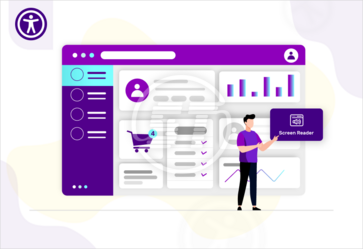Lately, when organizations have switched their focus towards digital transformation, government and public sector websites ought to become accessible channels for citizens. From tax filing to healthcare enrolment, every individual relies on these digital platforms to access critical services and information.
Thereby digital access must be equitable. When government websites are not accessible to people with disabilities, a significant segment of population don’t get chance to alienate with government schemes and services. And they also violate the imposed laws. For this reason, public sector organizations and government agencies using Drupal as a preferred content management system (CMS) for their websites are increasingly turning to WCAG compliance consultants to ensure accessibility.
Let’s understand!
The high stakes of accessibility in the public sector & legal frameworks around the world!
Government websites cater to a diverse population. Healthcare, banking, education, and several other services and benefits must be available to everyone including individuals with disabilities. Accessibility is not just a moral obligation; it’s a legal requirement in many jurisdictions.
For example:
- The Americans with Disabilities Act (ADA) and Section 508 in the U.S.
- The Accessibility for Ontarians with Disabilities Act (AODA) and Accessible Canada Act (ACA) in Canada.
- EU Web Accessibility Directive and European Accessibility Act (EAA) in Europe.
- India’s Rights of Persons with Disabilities Act (RPWD) 2016.
Failure to achieve recommended accessibility standards can result in legal action, public backlash, and exclusion of citizens from essential services. Most importantly, government websites can lead with examples for other sector websites.
Drupal – A preferred CMS for government, why?
Drupal powers several public sector and government websites worldwide. From small sites to huge portals, it is a chosen CMS because of its:
- Security: Powerful security features and a robust permissions system.
- Scalability: Supports high-traffic and content-heavy websites.
- Modularity: Customizable architecture with many useful contributed modules.
- Multilingual capabilities: Manages to serve heterogeneous populations.
- Open-source license: No vendor lock-in and no licensing fees.
- Community support: Large, active global community with modules tailored for public use cases.
But despite Drupal’s built-in accessibility features such as semantic HTML5 output, customizable themes, and ARIA roles, WCAG compliance is not a magic. Ensuring accessibility requires deliberate configuration, testing, and validation. And thus, Drupal WCAG compliance consultant becomes indispensable.
Drupal WCAG compliance consultant’s role – A cornerstone of Drupal accessibility!
A Drupal WCAG compliance consultant specializes in bridging the gap between technical Drupal implementations and accessibility standards. Some of the crucial reasons why government agencies rely on them:
- Expertise in both Drupal and WCAG standards
The experienced professionals understand Drupal’s built-in accessibility and other features and are seasoned in WCAG 2.1 AA or Section 508 standards. Drupal compliance consultants bring this dual expertise to implement appropriate Drupal themes, modules, and content structures that are accessible from the ground up.
- An in-depth auditing process
Drupal WCAG consultants conduct accessibility audits using both automated accessibility testing tools and manual accessibility audit, including screen reader and keyboard-only navigation tests. They help identify issues like missing alt text, improper heading structure, inaccessible forms or modal dialogs, and poor color contrast.
They also evaluate HTML structures, ARIA attributes, page hierarchy and semantics, audio/video content, and forms.
- Remediation and theming best practices
Audits are followed by remediation process. Drupal consultants work with development teams to:
- Fix all the inaccessible elements like modals, menus, and forms.
- Ensure custom themes follow WCAG guidelines.
- Remove accessibility regressions caused by third-party modules or code.
- Optimize for mobile accessibility.
They may also recommend or develop accessible design systems based on Drupal’s frontend frameworks like Bootstrap or Claro.
- Policy support, governance, and documentation
Accessibility ought to be an ongoing responsibility. Consultants help institutions create long-term strategies by:
- Developing accessibility governance policies.
- Creating content publishing guidelines for editors and authors.
- Documenting accessibility features and testing protocols.
- Establishing QA checklists for future releases.
The documentation and appropriate policies ensure that accessibility is maintained for longer span even after the initial fixes are deployed.
- Customized module development
Several Drupal modules offer enhanced functionality, but not all are accessible by default. Consultants:
- Evaluate contributed modules for WCAG compliance.
- Modify or patch modules to meet accessibility requirements.
- Create custom accessible modules if needed.
- Recommend alternative solutions that stabilize usability, compliance, and performance.
- Training and capacity building
Drupal accessibility consultants also empower internal teams through training:
- Content creators learn how to write accessible content and use proper heading structures, alt text, and ARIA labels.
- Developers are taught to build compliant components and use semantic HTML.
- QA teams are trained on testing for accessibility before deployment.
The resource upskilling creates a culture of accessibility within the organization.
You may also like: WCAG & ADA accessibility for Drupal multi-language sites
Benefits of Drupal compliance consultant partnership with government and public sector agencies!
Government and public sector organizations often have limited internal resources for pertinent accessibility implementation and testing. By partnering with WCAG compliance consultants, these organizations gain:
- Confidence in meeting mandatory legal obligations.
- Assurance that their digital platforms are usable by all citizens.
- Improved SEO and website performance due to adherence to web best practices.
- A reputation for inclusivity and transparency.
In a nutshell,
Inclusion is no longer a nice-to-have characteristic – it’s a fundamental requirement for public service. As Drupal continues to power a profound number of government digital infrastructure, Drupal WCAG compliance consultants are essential allies in making sure no citizen is deprived of digital access.
By combining technical expertise, legal insight, and a commitment to user-centered design, these Drupal consultants assist ensure that government websites live up to their promise of accessibility for all.
More about Drupal: Drupal CMS 1.0 Release
At Skynet Technologies, we believe accessibility should be built into every digital experience from the start. Our team of experienced WCAG consultants specializes in helping government agencies and public sector organizations achieve fully accessible, compliant, and user-friendly Drupal websites.
If you're ready to enhance site's accessibility and meet today’s evolving standards, reach out hello@skynettechnologies.com to schedule a consultation.


